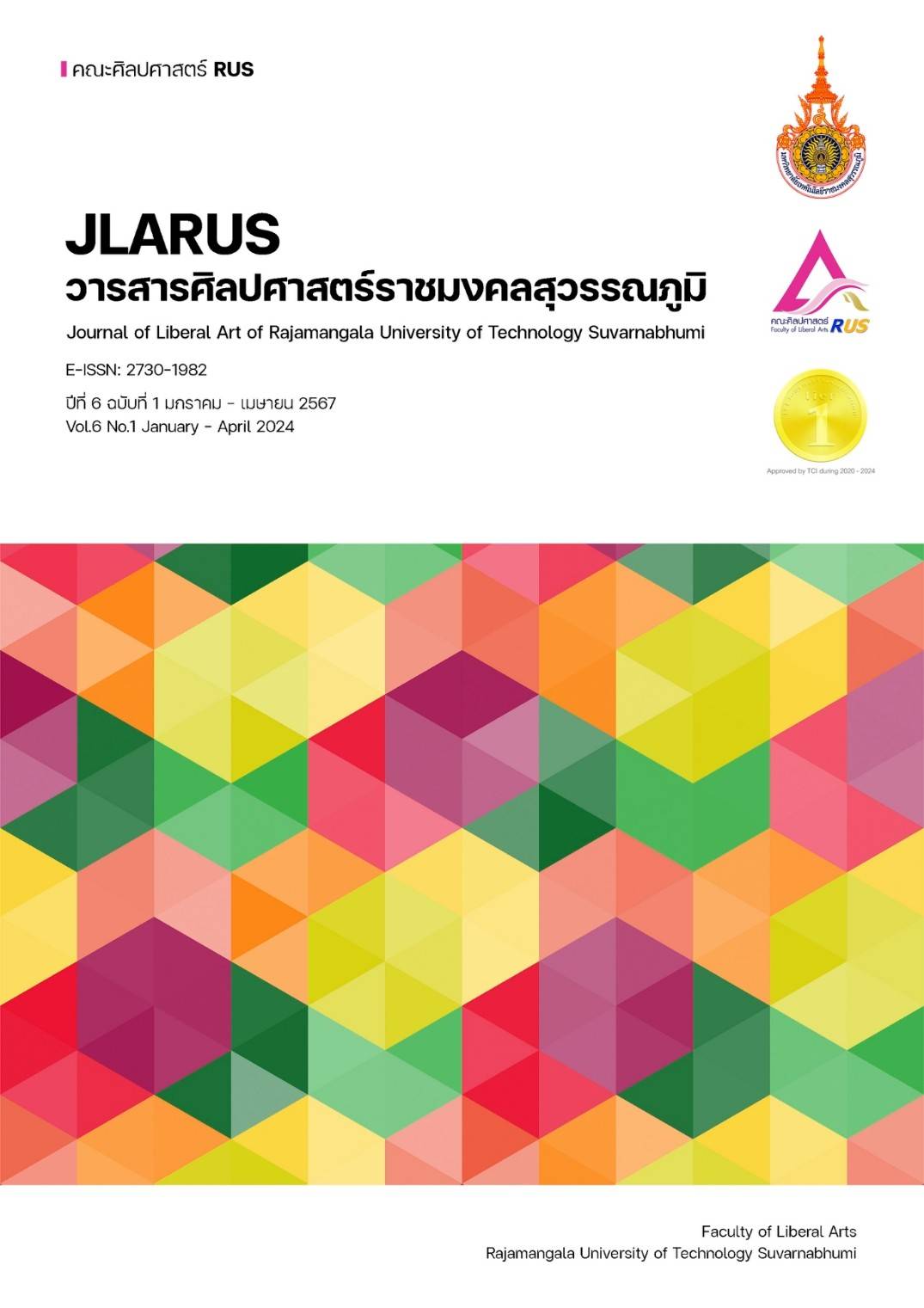CREATING AND TRANSFERRING TECHNOLOGY TO MASSIVE OPEN ONLINE COURSE (MOOC) PLATFORM OF RAJAMANGALA UNIVERSITY OF TECHNOLOGY SUVARNABHUMI
Main Article Content
Abstract
This research studied an online teaching and learning platform with open standards that promotes lifelong learning for future skills. An online teaching platform with open standards of Rajamangala University of Technology Suvarnabhumi (RUS MOOC) was created for enhancing teaching quality. The Massive Open Online Courses (MOOCs) are a digital age learning innovation that modern higher education institutions pay attention to and implement in teaching, learning, and academic services. The research objectives are to: 1) develop and examine appropriateness of the MOOC platform of Rajamangala University of Technology Suvarnabhumi (RUS MOOC) and 2) study the outcomes of the RUS MOOC technology transfer. The target group of the research includes three experts in ICT for education and 104 staff of Rajamangala University of Technology Suvarnabhumi in four campuses: 1) Phra Nakhon Si Ayutthaya Hantra, 2) Phra Nakhon Si Ayutthaya Wasukri, 3) Nonthaburi, and 4) Suphan Buri.
The research results revealed that: 1. The development of the RUS MOOC platform consists of five subsystems; namely, 1) Member Management System, 2) Course Management System, 3) Assessment Management System, 4) Linked Social Media, and 5) Feedback and Report. 2. The appropriateness assessment of the RUS MOOC platform by three experts in ICT for Education found that the developed platform is highly appropriate, with a mean score of 4.56 and a standard deviation (S.D.) of 0.51. and 3. The participants who underwent practical training for the aforementioned platform technology transfer were generally very satisfied, with a mean score of 4.17 and a standard deviation (SD) of 0.76.
Article Details

This work is licensed under a Creative Commons Attribution-NonCommercial-NoDerivatives 4.0 International License.
References
กาญจน์ ณ ศรีธะ, จิติมนต์ อั่งสกุล และธรา อั่งสกุล. (2565). การพัฒนาระบบประเมินพฤติกรรมด้านจิตพิสัยในการจัดการเรียนการสอนออนไลน์. วารสารศึกษาศาสตร์ มหาวิทยาลัยนเรศวร, 24(4), 84–97.
กาญจนา บุญภักดิ์. (2563). การจัดการเรียนรู้ ยุค New Normal. วารสารครุศาสตร์อุตสาหกรรม, 19(2), 1-6.
ชโรชีนีย์ ชัยมินทร์. (2562). MOOC: เพื่อการเรียนรู้ตลอดชีวิตในศตวรรษที่ 21. Journal of Humanities and Social Sciences, CMRU, 1(1), 64-70.
ณฐภัทร ติณเวส และฐาปนีย์ ธรรมเมธา. (2559). การศึกษารูปแบบการจัดการศึกษาออนไลน์ระบบเปิดแบบ MOOC ของอุดมศึกษาไทย. วารสารมหาวิทยาลัยศิลปากร ฉบับภาษาไทย สาขามนุษยศาสตร์ สังคมศาสตร์ และศิลปะ, 9(3),1463-1479.
ธงชัย อรัญชัย. (2559). การพัฒนารูปแบบการเรียนการสอนวิชาความปลอดภัยในงานอุตสาหกรรม ตามแนวคิดจิตตปัญญาศึกษา. Journal of Industrial Education, 15(2), 80-85.
พงศ์ทัศ วนิชานันท์. (2563). การศึกษาพื้นฐานในยุค โควิด-19 จะเปิด-ปิดโรงเรียนอย่างไร.สืบค้น 4 ธันวาคม 2563. จาก https://tdri.or.th/2020/05/basic-education-in-covid-19-crisis-reopening-school-after-lockdown.
ภัทรนันท์ ไวทยะสิน. (2562).“เปลี่ยน” ผู้เรียนเป็นนวัตกร นวัตกรรมใหม่ของการเรียนการสอนในยุคการศึกษา 4.0. วารสารเทคโนโลยีและสื่อสารการศึกษา ECT Journal, 14(17), 37-51.
สุรศักดิ์ ปาเฮ. (2561). การศึกษาออนไลน์ ทฤษฎีและวิธีปฏิบัติ. แพร่: หจก.แพร่อุตสาหกรรมการพิมพ์.
อภิชาติ รอดนิยม. (2564). เทคโนโลยีการ ศึกษากับการจัดการเรียนการสอนออนไลน์ ในยุคใหม่. วารสารสังคมศาสตร์และมานุษยวิทยาเชิงพุทธ, 6(9), 123-133.
Al-Adwan, A. S. (2020). Investigating the drivers and barriers to MOOCs adoption: The perspective of TAM. Education and information technologies, 25(6), 5771-5795.
Harvard University, & Massachusetts Institute of Technology. (2016). MOOCs. Retrieved Aug 1, 2022, from http://mooc.org/.
Likert, R. (1967). The Method of Constructing and Attitude Scale. New York: John Wiley & Sons.
Tawafak, R. M., Malik, S. I., & Alfarsi, G. (2020). Development of framework from adapted TAM with MOOC platform for continuity intention. Development, 29(1), 1681-1691.
Abeer, W., & Miri, B. (2014). Students’ preferences and views about learning in a MOOC. Procedia-Social and Behavioral Sciences, 152, 318-323.
Yamamoto, T., Sasaki, T., & Hayashida, S. (2015). MOOC Based Educational Model for Pre-University Writing Program. In International Symposium on Grids and Clouds (ISGC). 15(20).


